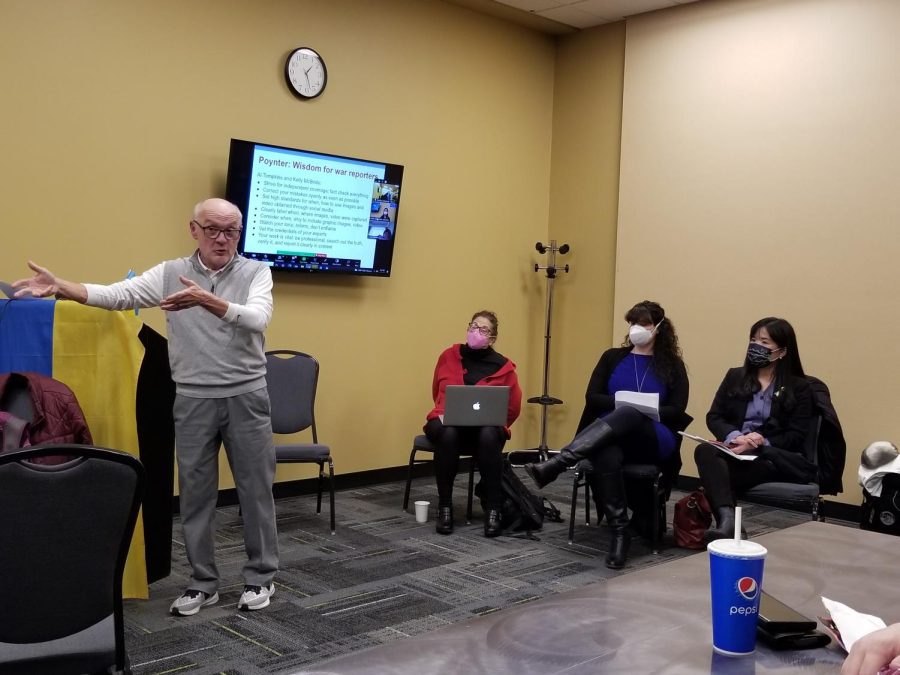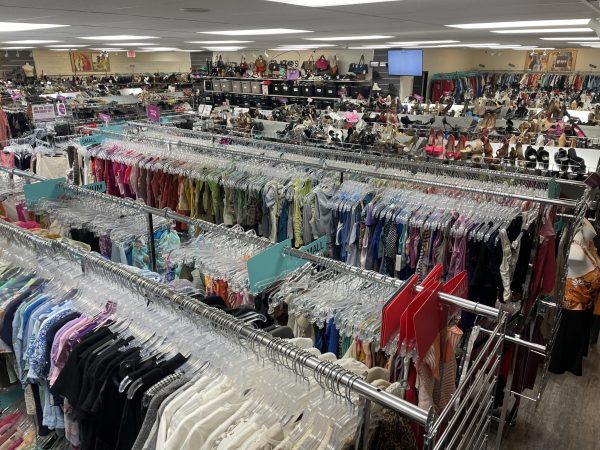CJPR hosts “Reporting from a War Zone: Ethics, Trauma, Impact, and Solutions”
(From left to right) Professor Garry Gilbert presenting, with panelists Catherine Shafran, Professor Kate Roff and Professor Chiaoning Su.
On March 22, the Communication, Journalism and Public Relations Department (CJPR) at Oakland University hosted “Reporting from a War Zone: Ethics, Trauma, Impact, and Solutions.” The panel discussion was held in a hybrid format and moderated by Dr. Adina Schneeweis, associate professor and Journalism program director.
Schneeweis introduced the discussion by explaining the panel discussion’s goal saying, “the journalism faculty invites you to consider this conflict from the perspective of those gathering information, dispelling lies and putting their lives at risk so that we see images and truths about the war – in other words — from the perspective of journalists.”
Feb. 24, 2022, marked the first day of Russian missile and artillery attacks aimed at major Ukrainian cities. Statements from Vladimir Putin directed to the media emphasize their goal of preventing Ukraine’s alliance with the EU or Nato. Putin sees Ukraine’s prospective alliance as the “disintegration of historical Russia.” However, what the Russian leader described as a “special military operation” quickly became a war with nearly 19,000 deaths and approximately ten million displaced people.
Born and raised in Romania, Schneeweis gave her multicultural insight into the Ukraine invasion.
“My family in Romania reminded me of an important aspect of this war we don’t often hear about – and that is the fact that many, many of those that have so far left Ukraine are those that can afford to,” Schneeweis said. “Many of the refugees in Romania had the money and resources to get out right away and have family in Western European countries, so they keep moving west and out of Romania to reach them. Those that cannot get out, the poor, the disabled, the disadvantaged, the marginalized have a harder time escaping to safety.”
The panel started with Garry Gilbert, a special lecturer, who shared further historical context of reporting from conflict zones. Gilbert called attention to many famous war photographs and the context and lives behind those artworks.
Secondly, Catherine Shafran — documentary writer and producer — shared her personal and professional experience about reporting war, highlighting her on-ground experience in Israel and Palestine.
Further on in the panel, Kate Roff — journalist, editor, and special lecturer — talked about the differences in media language used to describe conflicts. She also introduced the importance of peace journalism.
To conclude, Dr. Chiaoning Su, assistant professor, emphasized the role of social media in covering war. Su pointed out how the current war is being called the first “TikTok War.”
Differently from any other prior conflict, news consumers are not only receiving information through traditional media channels, but many young viewers are following the war news directly from the perspective of Ukrainians. Su also shared remarks on misinformation.
Among the many important names cited throughout the conversation, Su presented Salwan Georges. Georges “is a Pulitzer Prize-winning photojournalist for The Washington Post.” An OU Journalism alumni, Salwan Georges is currently in Ukraine documenting the ongoing invasion. His photos were also used by Ukraine President, Volodymyr Zelenskyy.
Georges’s work is the representation of how documenting a war goes way beyond what is noticed through traditional media.
Schneeweis concluded the panel by reading the following quote from a message to the people of the world shared in 1985 during the United Nations International Year of Peace:
“Whether peace is to be reached only after unimaginable horrors precipitated by humanity’s stubborn clinging to old patterns of behavior, or is to be embraced now by an act of consultative will, is the choice before all who inhabit the earth. At this critical juncture when the intractable problems confronting nations have been fused into one common concern for the whole world, failure to stem the tide of conflict and disorder would be unconscionably irresponsible.” (The Universal House of Justice, the world administrative body of the Bahá’í Faith).










